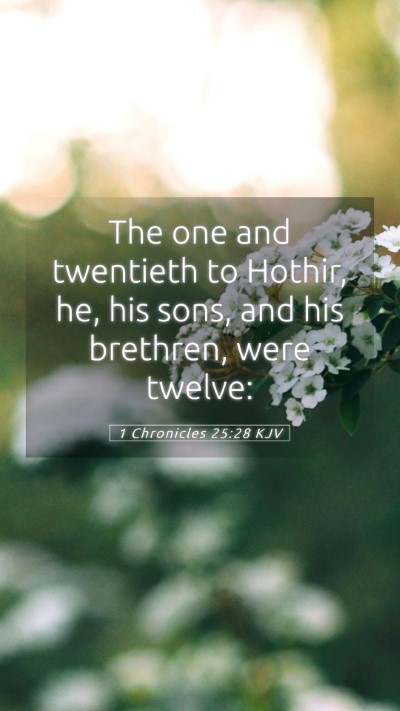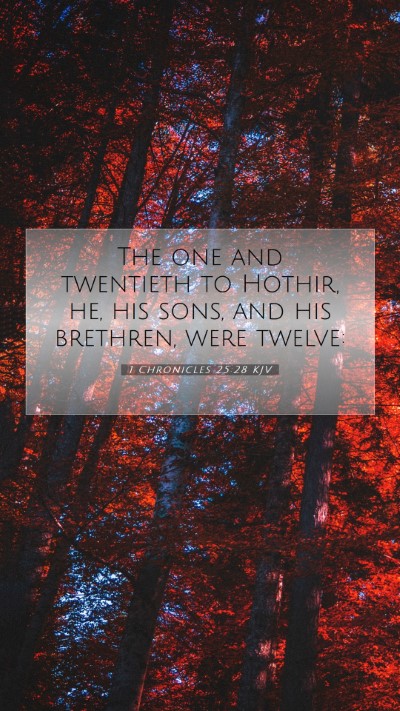Understanding 1 Chronicles 25:28
This analysis provides a comprehensive understanding of 1 Chronicles 25:28, utilizing insights from various public domain commentaries, particularly those by Matthew Henry, Albert Barnes, and Adam Clarke. This verse falls within the context of the organization of worship and the arrangement of music in the temple.
Verse Context and Overview
1 Chronicles 25:28 states: “All these were the sons of Heman, the king’s seer; in the words of God, to lift up the horn. And God gave to Heman fourteen sons and three daughters.” This verse highlights the musical family of Heman, emphasizing their role in spiritual service.
Commentary Insights
-
Matthew Henry's Commentary
Matthew Henry emphasizes the importance of Heman as a prophet and a member of the Levitical choir. He notes that the term "lift up the horn" can signify the exaltation of God's glory through music. Henry also reflects on how God's call to worship through music was vital for Israel's spiritual life.
-
Albert Barnes' Commentary
Albert Barnes discusses the lineage of Heman and remarks on the significance of having a large family dedicated to temple service. He posits that the mention of Heman’s sons and daughters indicates the importance of generational worship and the continuation of faith through family. Barnes highlights that Heman's role was not just to lead musically but to engage in prophetic utterances, suggesting a dual calling in his service.
-
Adam Clarke's Commentary
Adam Clarke provides historical context, underscoring that Heman was not only a musician but also recognized for his ability to prophesy. Clarke notes that the specific number of sons and daughters suggests a divine blessing and familial responsibility in leading worship. He connects Heman’s legacy to the broader theme of worship continuity in Israel.
Bible Verse Meanings and Interpretations
This verse acquires meaning through its emphasis on worship, family, and divine service. Here are the central themes derived from the commentaries:
- Role of Worship: The primary role attributed to Heman and his family is leading worship in the temple, indicating the centrality of music in Israel’s spiritual practice.
- Prophetic Service: Heman was recognized not just as a musician but as a seer, showing that worship encompasses both artistry and spiritual insight.
- Generational Continuity: The focus on Heman’s large family reflects the idea of worship being passed down from generation to generation, linking past faith traditions with present practice.
- Divine Favor: The mention of numerous descendants symbolizes God’s blessing, establishing the connection between faithfulness in service and God's generosity.
Application of the Verse
For modern readers, 1 Chronicles 25:28 highlights the importance of cultivating a life of worship and recognizing one's vocation as an opportunity to exalt God. Here are ways to apply the insights to daily living:
- Engage in Worship: Actively participate in worship through music, service, or leadership, reflecting the call to exalt God.
- Promote Family Worship: Encourage family members to engage in worship, emphasizing continuity in faith within the family structure.
- Understand Your Calling: Recognize the dual aspects of your vocation or ministry as both a literal and spiritual service to God, similar to Heman’s prophetic role.
Historical and Cultural Context
The context of this verse is crucial for understanding the structure of worship during the era. Music played a key role in Israel’s worship practices, with designated families handling specific responsibilities. Heman, as one of the leaders, indicated that music was not only meant for entertainment but as an elevate form of worship before God.
Related Bible Verses
- 1 Chronicles 6:31-32: Discusses the appointment of Levitical musicians.
- Psalms 88:1: A psalm attributed to Heman, illustrating his literary influence.
- 2 Chronicles 5:12-14: Describes the worship in the temple, affirming the role of musicians like Heman.
Conclusion
The insights and detailed examination of 1 Chronicles 25:28 illustrate the significance of biblical worship practices and the legacy of dedicated individuals like Heman. By interpreting this verse through the lens of historical context and spiritual application, believers can cultivate a deeper understanding of their own call in worship and community service.


